希特勒的英文简介
- 格式:ppt
- 大小:1.81 MB
- 文档页数:22
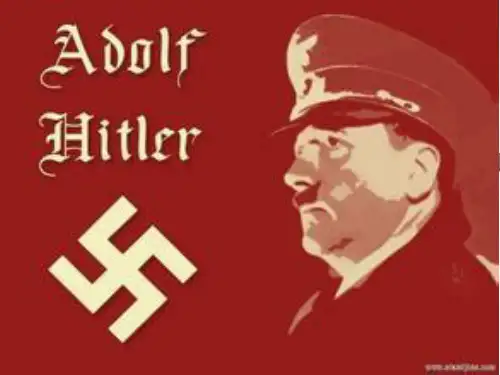
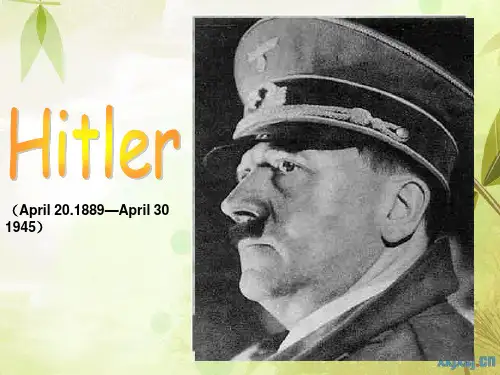
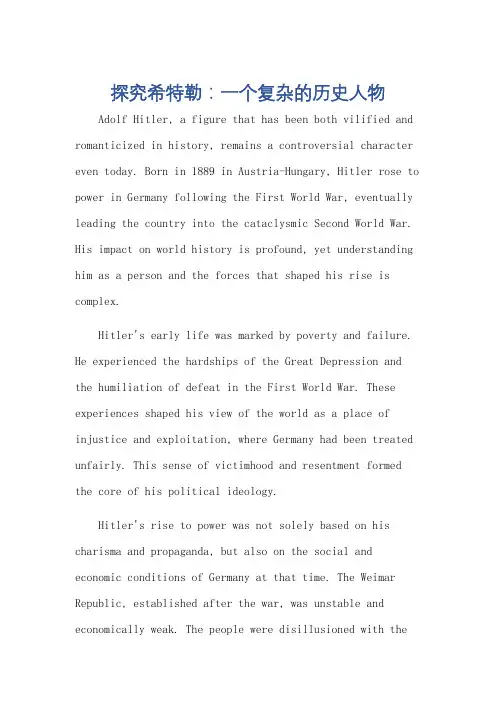
探究希特勒:一个复杂的历史人物Adolf Hitler, a figure that has been both vilified and romanticized in history, remains a controversial character even today. Born in 1889 in Austria-Hungary, Hitler rose to power in Germany following the First World War, eventually leading the country into the cataclysmic Second World War. His impact on world history is profound, yet understanding him as a person and the forces that shaped his rise is complex.Hitler's early life was marked by poverty and failure. He experienced the hardships of the Great Depression and the humiliation of defeat in the First World War. These experiences shaped his view of the world as a place of injustice and exploitation, where Germany had been treated unfairly. This sense of victimhood and resentment formed the core of his political ideology.Hitler's rise to power was not solely based on his charisma and propaganda, but also on the social and economic conditions of Germany at that time. The Weimar Republic, established after the war, was unstable and economically weak. The people were disillusioned with thepolitical class and yearned for strong leadership. Hitler's promise of national rejuvenation and revenge against Germany's enemies resonated with many.His Nazi Party, with its antisemitic and racist rhetoric, capitalized on the fears and anxieties of the German people. Hitler's propaganda machine, led by Joseph Goebbels, used every means possible to spread the Nazi message and create a cult of personality around Hitler himself. The result was a powerful movement that swept Hitler into power in 1933.Once in power, Hitler embarked on a campaign ofnational rejuvenation and expansion. He rebuilt the German economy, rearmed the country, and established atotalitarian state that controlled all aspects of life. His foreign policy was aggressive, seeking to restore Germany's lost territorial gains and influence. This led to the annexation of Austria, the Sudetenland, and ultimately the invasion of Poland that triggered the Second World War.Hitler's leadership style was autocratic and dictatorial. He surrounded himself with loyal followers and purged anyone who challenged his authority. His paranoiaand obsession with power led him to commit atrocities such as the Night of the Long Knives, where he eliminated potential rivals within the Nazi Party, and the systematic murder of millions of Jews, Poles, and other perceived enemies of the Reich.Hitler's impact on world history was profound. His aggressive foreign policy led to the deaths of millions and the destruction of entire nations. His legacy of hate and division has had lasting effects on global politics and society. However, it is important to remember that Hitler was not solely responsible for the horrors of the Second World War. The actions of other leaders, such as Joseph Stalin and Winston Churchill, also played a role.In conclusion, Hitler was a complex figure whose rise to power was influenced by both personal and historical factors. Understanding him requires a nuanced understanding of the social and political context of his time. While his actions and ideologies are deeply immoral and abhorrent, it is important to remember that he was not an isolated figure acting alone. The lessons of history must be learned, andHitler's rise and fall serve as a powerful reminder of the consequences of ignoring the warnings of the past.**探究希特勒:一个复杂的历史人物**阿道夫·希特勒,这位历史人物在世人眼中既被妖魔化又被理想化,即使在今天仍然是一个备受争议的人物。
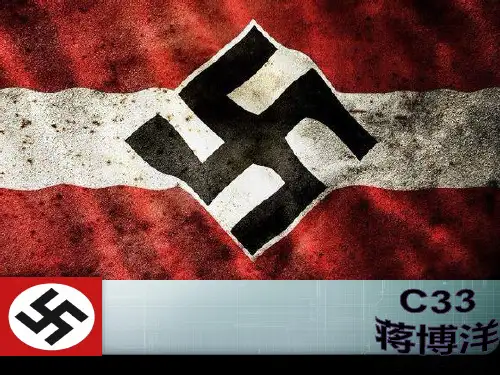
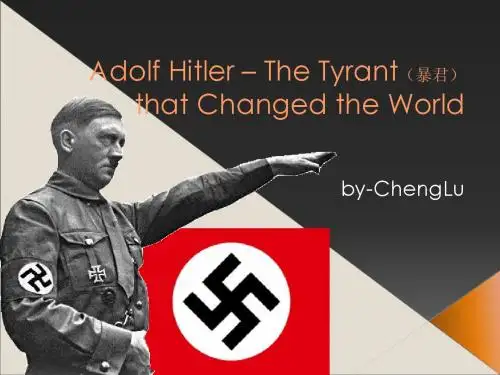
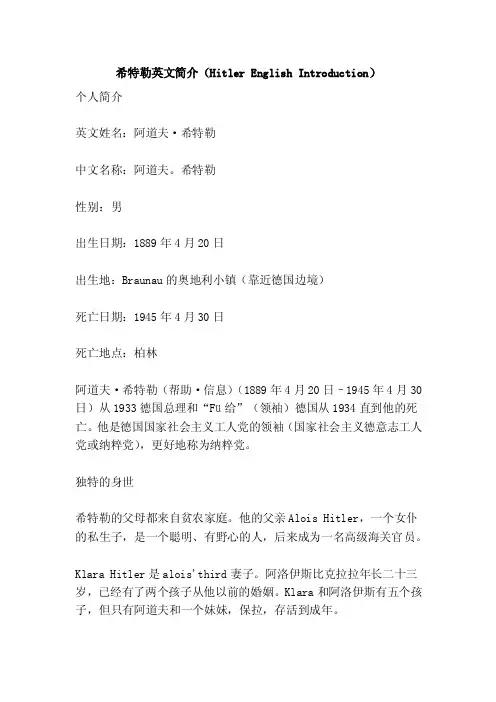
希特勒英文简介(Hitler English Introduction)个人简介英文姓名:阿道夫·希特勒中文名称:阿道夫。
希特勒性别:男出生日期:1889年4月20日出生地:Braunau的奥地利小镇(靠近德国边境)死亡日期:1945年4月30日死亡地点:柏林阿道夫·希特勒(帮助·信息)(1889年4月20日–1945年4月30日)从1933德国总理和“Fü给”(领袖)德国从1934直到他的死亡。
他是德国国家社会主义工人党的领袖(国家社会主义德意志工人党或纳粹党),更好地称为纳粹党。
独特的身世希特勒的父母都来自贫农家庭。
他的父亲Alois Hitler,一个女仆的私生子,是一个聪明、有野心的人,后来成为一名高级海关官员。
Klara Hitler是alois'third妻子。
阿洛伊斯比克拉拉年长二十三岁,已经有了两个孩子从他以前的婚姻。
Klara和阿洛伊斯有五个孩子,但只有阿道夫和一个妹妹,保拉,存活到成年。
发展过程1.student2.soldier3.do在小学4.stop试图成为第一研究最喜欢的游戏艺术5.move维也纳6.receive父亲的公务员养老7.volunteer FR德国军队在慕尼黑9.rebuild8.be纳粹aarty其他士兵逮捕10.establish第三帝国11.base专制mand他的军队去打仗13.die希特勒与中日关系的两面性希特勒关于中国和日本1的想法。
鄙视日本看好中国他看着日本。
但是,他看好中国。
2。
喜欢中国茶叶希特勒喜欢喝中国茶。
3。
希特勒不准报道南京大屠杀希特勒不允许人们报告南京大屠杀。
阿道夫。
希特勒已经不再是之一个人,他泛指了一个时代的血型与残暴,扭曲与狭隘。
他是法西斯的象征,而他背后,是第二次世界大战的开始与终结。
阿道夫·希特勒不再是一个人,他是指血液和残酷的时代,失真和狭窄。
他是法西斯的象征,在他身后,是第二次世界大战和结束的开始。
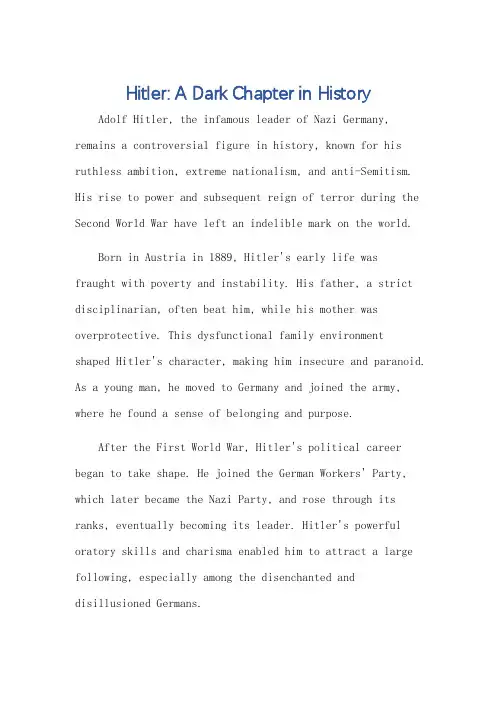
Hitler: A Dark Chapter in HistoryAdolf Hitler, the infamous leader of Nazi Germany, remains a controversial figure in history, known for his ruthless ambition, extreme nationalism, and anti-Semitism. His rise to power and subsequent reign of terror during the Second World War have left an indelible mark on the world.Born in Austria in 1889, Hitler's early life wasfraught with poverty and instability. His father, a strict disciplinarian, often beat him, while his mother was overprotective. This dysfunctional family environment shaped Hitler's character, making him insecure and paranoid. As a young man, he moved to Germany and joined the army, where he found a sense of belonging and purpose.After the First World War, Hitler's political career began to take shape. He joined the German Workers' Party, which later became the Nazi Party, and rose through its ranks, eventually becoming its leader. Hitler's powerful oratory skills and charisma enabled him to attract a large following, especially among the disenchanted anddisillusioned Germans.Hitler's political philosophy was based on extreme nationalism, anti-Semitism, and social Darwinism. He believed that the German race was superior to all others and that the Jews were a threat to German society. He advocated for the expansion of German territory and the elimination of all perceived threats to the Reich.Under Hitler's leadership, the Nazi Party gained significant political power in Germany. In 1933, Hitler became the Chancellor of Germany and quickly consolidated his grip on power. He abolished democratic institutions, established a totalitarian state, and began to implement his radical agenda.Hitler's reign of terror was marked by widespread discrimination, persecution, and violence. Jews, homosexuals, political opponents, and others were targeted for elimination. Concentration camps were established, and millions of people were killed or enslaved. Hitler's ambitions led him to invade numerous countries, including France, Belgium, the Netherlands, and Russia, in a bid for world domination.The Allied Powers, led by the United States, Great Britain, and Russia, eventually defeated Germany in the Second World War. Hitler's reign came to an end in April 1945, when he committed suicide in his bunker in Berlin, rather than face capture and trial.The legacy of Hitler and the Nazi era is complex and multifaceted. While Hitler's actions and ideologies were barbaric and reprehensible, they also serve as a stark reminder of the dangers of unchecked ambition, intolerance, and hatred. Hitler's rise to power and the atrocities committed under his leadership are a cautionary tale forall nations and generations.**希特勒:历史中的黑暗篇章**阿道夫·希特勒,纳粹德国的臭名昭著的领导人,以他冷酷无情的野心、极端民族主义和反犹太主义而臭名昭著,在历史中是一个充满争议的人物。
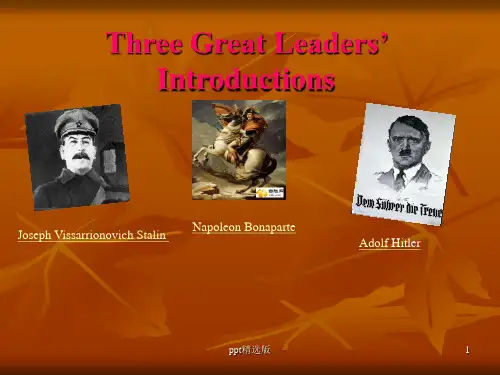
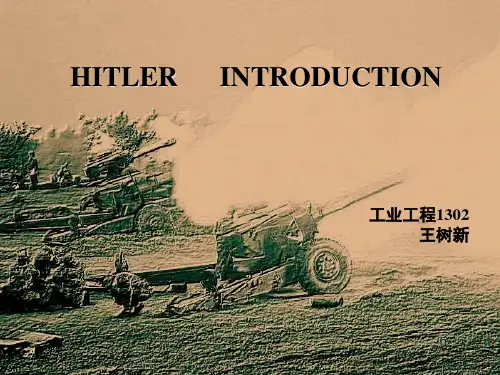
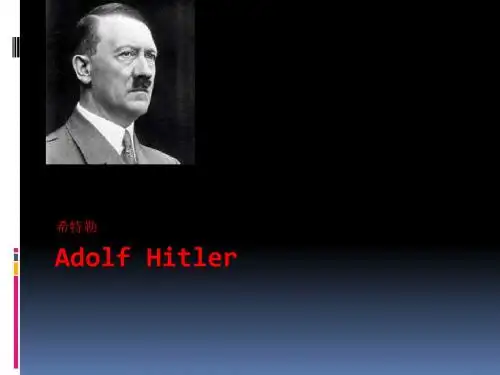
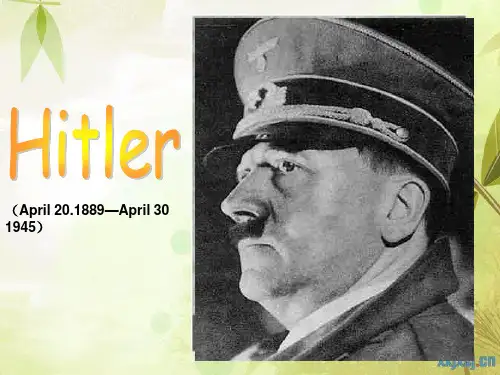
希特勒(1889.4.20-1945.4.30),纳粹德国元首,第二次世界大战的发动者和最大战犯。
他是人类最大的战争魔王,曾将亿万人卷进了一场史无前例的浩劫,却最终被钉在历史的耻辱柱上;他曾想独霸世界,涂炭生灵,却最终自掘坟墓,惨败收场;他生前耀武扬威,显赫一时,却最终畏罪自杀,逃脱正义的审判。
这就是希特勒——一个将人类带进战争深渊的恶魔,一个充满扩张与集权理念的独裁者,一个具有变态人格与复仇情结的政治狂人。
作为最终成为纳粹德国权力中心的焦点人物,按道理讲,希特勒应该把他的荣耀追溯到他的童年及先辈。
可是希特勒生前很少谈起他的身世。
不仅如此,他也从不允许别人谈论他的身世,这是为什么呢?这个人类最大的战争魔王究竟有怎样难以启齿的身世呢?1919年9月,希特勒参加了德国工人党,依靠他的机智狡猾和反动宣传鼓动才能,希特勒最终将德国工人党更名为国家社会主义德国工人党,简称纳粹党,并正式成为纳粹党的党魁。
从此,他开始正式推行以集权与扩张为核心的纳粹政治理念。
然而他在刚一起步的时候,就遇上了麻烦,这个想当德国元首建立中央集权的阿道夫·希特勒,首先成了一个阶下囚,这究竟是怎么回事呢?希特勒的《我的奋斗》究竟是一本什么样的书?为什么会在德国风靡一时?为什么会在日耳曼人身上产生难以估量的魔力,让人们为希特勒东征西杀,流血卖命?在服刑九个月后,希特勒被提前获释出狱。
此时,纳粹党已被取缔,许多人都认为希特勒从此会销声匿迹,无声无息。
那么,有着强烈扩张与独裁理念的希特勒会就此甘心寂寞吗?具有思辨与判断能力的德意志民族,会选择一个独裁者做他们的领袖吗?今天的欧洲是世界上物质和精神文明比较发达的地区,人们在这块土地上,享受着和平、安宁的生活。
但是六十多年前,这块土地却到处是断垣残壁,到处是痛苦的呻吟,到处是硝烟炮火,到处是鲜血与尸体。
而造成这一切的,就是我手中的这个小男孩,这个小男孩的名字就是阿道夫·希特勒。
英语介绍希特勒的作文简单Title: Adolf Hitler: A Brief Introduction。
Adolf Hitler, born on April 20, 1889, in Braunau am Inn, Austria, rose to become one of the most notorious figuresin history. His impact on the world, particularly duringthe 20th century, cannot be overstated. Hitler's life, beliefs, and actions continue to be subjects of intense study and debate.Early Life:Hitler's early life was marked by struggles and aspirations. He was the fourth of six children born toAlois Hitler and Klara Pölzl. His childhood was notwithout difficulties, as his father passed away when he was just 13 years old. After his father's death, Hitler's ambition to become an artist led him to Vienna, where he attempted to gain admission to the Academy of Fine Arts. However, he faced rejection, which fueled his growingresentment and disillusionment.Rise to Power:Following World War I, Hitler found his way into politics. He joined the German Workers' Party, which later transformed into the National Socialist German Workers' Party (NSDAP), commonly known as the Nazi Party. Hitler's charismatic speaking abilities and radical nationalist views quickly gained him attention and support within the party. By 1933, amidst political turmoil and economic instability, Hitler was appointed Chancellor of Germany. His consolidation of power was swift, culminating in the establishment of a totalitarian regime.Beliefs and Ideology:Central to Hitler's ideology was the notion of racial superiority, particularly the belief in the superiority of the Aryan race. He propagated anti-Semitic sentiments, blaming Jews for various societal ills and advocating for their exclusion and eventual eradication. Hitler's visionof a racially pure Germany led to the implementation of discriminatory laws and, ultimately, the systematic genocide of six million Jews during the Holocaust.World War II:Hitler's aggressive expansionist policies and militarization of Germany inevitably led to the outbreak of World War II in 1939. His invasion of Poland prompted the Allied powers, including Britain, France, and later the United States, to declare war on Germany. Hitler'sstrategic errors and overreach, particularly the ill-fated invasion of the Soviet Union in 1941, contributed to Germany's eventual defeat. The war resulted in unparalleled devastation and loss of life, with estimates of over 70 million people killed.Downfall and Legacy:As Allied forces closed in on Germany in 1945, Hitler's regime crumbled. Rather than face capture and trial, Hitler committed suicide in his underground bunker in Berlin onApril 30, 1945. His death marked the end of one of the darkest chapters in human history. The legacy of Adolf Hitler remains a stark reminder of the dangers of unchecked power, propaganda, and intolerance.In conclusion, Adolf Hitler's life and actions continue to be subjects of both fascination and horror. His rise to power, driven by nationalist fervor and fueled by hatred, led to catastrophic consequences for millions of people. Understanding Hitler's legacy is crucial in preventing the recurrence of similar atrocities in the future.。
英文作文:Adolf Hitler: A Brief IntroductionAdolf Hitler, a name that still resonates with controversy and history, was a German politician and the leader of the National Socialist German Workers' Party, commonly known as the Nazi Party. His rise to power and subsequent actions had a profound impact on the 20th century, particularly during the Second World War.Born in 1889 in Braunau am Inn, Austria-Hungary, Hitler developed an early interest in politics and nationalism. After serving in the German army during the First World War, he joined the political scene and soon became the leader of the Nazi Party. His charismatic speeches and propaganda skills helped him gain a significant following among the German population, especially the working class and the middle class.Hitler's ideology was based on extreme nationalism, anti-Semitism, and racism. He believed that the Germans were a superior race and that the Jews and other minorities were inferior and should be eliminated. His policies led to the implementation of the Final Solution, which resulted in the systematic extermination of millions of Jews and other minorities throughout Europe.In 1933, Hitler became the Chancellor of Germany and effectively took control of the country. He established a totalitarian regime that suppressed political opposition, censored the media, and controlled the economy. His policies also led to the rearmament of Germany and the expansion of its territory through military aggression.Hitler's actions during the Second World War further cemented his image as a war criminal. He oversaw the invasion of several European countries, including France, Poland, and the Soviet Union, leading to the death of millions of civilians and soldiers. In the end, Hitler's regime was defeated by the Allied forces, and he committed suicide in his bunker in Berlin in 1945.Despite his role in causing immeasurable suffering and destruction, Hitler remains a controversial figure in history. His rise to power and the events that followed have been extensively studied and analyzed by historians and political scientists.中文翻译:阿道夫·希特勒:简介阿道夫·希特勒,这个名字仍然与争议和历史息息相关,他是一位德国政治家,也是国家社会主义德国工人党(通常被称为纳粹党)的领袖。